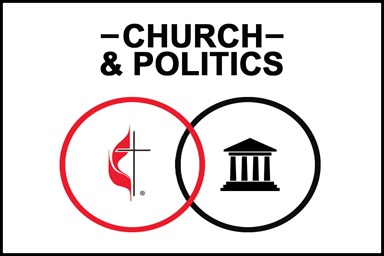Forty-five United Methodists will serve in the 113th United States Congress, three fewer than in the 112th.
The new Congress, which will convene on Jan. 3, 2013, will be the most religiously diverse in the nation's history. According to an analysis by the Pew Forum on Religion and Politics, the assembly will include the first Hindu in either chamber, the first Buddhist in the Senate and the first member describing her religion as "none."
In the Senate, United Methodists decreased from 11 to nine, while their House numbers dropped from 37 to 36.
Five United Methodists will be among the congressional freshmen, including Democrat Elizabeth Warren, who won the Senate race in Massachusetts. One of the highest-profile new members, Warren told Democratic convention delegates in September that she had taught a Methodist Sunday school class. Warren grew up in Oklahoma. She is a tenured professor at Harvard University.
New House members include Republicans Tom Cotton of Arkansas and Thomas Massie of Kentucky, as well as Democrats Mark Takano of California and Derek Kilmer of Washington.
Jim Winkler, chief executive of the United Methodist Board of Church and Society, said, "We will continue to reach out to United Methodist members in Congress, as before."
Eight United Methodists - three senators and five House members - serving in the 112th Congress were defeated or did not seek re-election. One of the most prominent was Indiana Sen. Richard Lugar whose 36-year career ended in a bitter Republican primary loss to Richard Mourdock, who then lost in November to Democrat Joe Donnelly.
Republican United Methodists in Congress outnumber Democrats 32 to 13.
United Methodists in the 113th Congress*
House (36)
Tom Cotton (R) Arkansas
Doris Matsui (D) California
Mark Takano (D) California
Mike Coffman (R) Colorado
Jeff Miller (R) Florida
Richard Nugent (R) Florida
Bill Posey (R) Florida
Bill Young (R) Florida
Rob Woodall (R) Georgia
David Loebsack (D) Iowa
Lynn Jenkins (R) Kansas
Kevin Yoder (R) Kansas
Thomas Massie (R) Kentucky
Ed Whitfield (R) Kentucky
Dutch Ruppersberger (D) Maryland
Mike Rogers (R) Michigan
John Kline (R) Minnesota
Bennie Thompson (D) Mississippi
Emanuel Cleaver II (D) Missouri
Lee Terry (R) Nebraska
Bob Gibbs (R) Ohio
Steve Stivers (R) Ohio
Tom Cole (R) Oklahoma
Stephen Fincher (R) Tennessee
Phil Roe (R) Tennessee
Joe Barton (R) Texas
John Culberson (R) Texas
Lloyd Doggett (D) Texas
Kay Granger (R) Texas
Gene Green (D) Texas
Ralph Hall (R) Texas
Sam Johnson (R) Texas
Pete Olson (R) Texas
Pete Sessions (R) Texas
Derek Kilmer (D) Washington
Rick Larsen (D) Washington
Senate (9)
Jeff Sessions (R) Alabama
Johnny Isakson (R) Georgia
Daniel Inouye (D) Hawaii
Jerry Moran (R) Kansas
Pat Roberts (R) Kansas
Elizabeth Warren (D) Massachusetts
Debbie Stabenow (D) Michigan
Richard Burr (R) North Carolina
Rob Portman (R) Ohio
United Methodist Governors
Rick Scott (R) Florida
Phil Bryant (R) Mississippi
Jay Nixon (D) Missouri
Nikki Haley (R) South Carolina
Earl Ray Tomblin (D) West Virginia
*This tabulation is based on the religious affiliations reported by CQ/Roll Call's "Guide to the New Congress," the Almanac of American Politics, and VoteSmart.com.
Texas has the largest United Methodist contingent, with nine members, all of whom were re-elected, followed by four each from Florida and Kansas and three from Ohio. Twenty-three states have at least one United Methodist in Congress. Kansas has the highest United Methodist percentage in its delegation, 67 percent.
The South and its border states are home to 26 United Methodists, while 12 represent states in the Midwest and six in the Far West. There is one United Methodist member from New England.
Fifty-six percent or 299 members of the new Congress identify themselves with Protestant denominations or non-denominational churches, down slightly from the 57 percent of those in the 112th. By denominational families, 30 percent are Roman Catholic, 14 percent are Baptist and 9 percent are Methodist. There are 15 Mormons, three Buddhists and two Muslims, the same as the 112th Congress, and 32 Jews, a reduction of seven.
The Governors
Five United Methodists are among the nation's governors.
Democrat Earl Ray Tomblin of West Virginia won a special election in 2011 and was re-elected this year and Republican Phil Bryant of Mississippi was elected in November 2011.
Democrat Jay Nixon of Missouri was re-elected in 2012.
Two other United Methodist governors are Republicans Nikki Haley of South Carolina and Rick Scott of Florida. Haley and Scott were first elected in 2010.
*Menendez is research director for Americans for Religious Liberty and has been writing about religion and politics since 1972.
News media contact: Tim Tanton, Nashville, Tenn., (615) 742-5470 or [email protected].
Like what you're reading? Support the ministry of UM News! Your support ensures the latest denominational news, dynamic stories and informative articles will continue to connect our global community. Make a tax-deductible donation at ResourceUMC.org/GiveUMCom.




